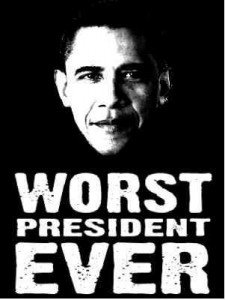Most businesses fail – is that the government help too?
I don’t see our young president taking credit on behalf of the state for all the failures it help cause, all the ideas that never got off the ground because the regulatory hurdles were so high, or all the established companies that never had to face competition because they had managed to get their rents written into law.
By Tom Smith at The Right Coast
Much could be said about how stupid was President [Obama’s] recent  comments about business founders not really having built their businesses by themselves, but rather owing them in large part to things others, especially the government, did for them. You drove on a public road to meet your 457th potential angel investor. Your third grade public school teacher taught you always to say please. And so government gets a lot of the credit for the thing you sweated blood to create. Big surprise. If you build anything, you can absolutely bet people will line up for the credit, like Al Gores for the internet. Failure, you can keep the credit for that.
comments about business founders not really having built their businesses by themselves, but rather owing them in large part to things others, especially the government, did for them. You drove on a public road to meet your 457th potential angel investor. Your third grade public school teacher taught you always to say please. And so government gets a lot of the credit for the thing you sweated blood to create. Big surprise. If you build anything, you can absolutely bet people will line up for the credit, like Al Gores for the internet. Failure, you can keep the credit for that.
But here’s the question to ask — how many more successful businesses, inventions, products, services, toys, tools, insights, and just plain fun would there be, if government did not in the first place make it so ridiculously difficult to start a business and keep it going? I don’t see our young president taking credit on behalf of the state for all the failures it help cause, all the ideas that never got off the ground because the regulatory hurdles were so high, or all the established companies that never had to face competition because they had managed to get their rents written into law. This is part of the seen and not seen insight of Bastiat. What you see is a successful business when it manages to survive, and then people run up, the same people who taxed and regulated it nearly to death, and say I helped! I helped! What you don’t see are all the businesses that perished or never got started because of the heavy hand of the state. And it’s a very heavy hand.
Yeah, the state provides public goods we all use, but could they do it any worse? I live in California, where the public schools mostly suck, are incredibly expensive in dollars spent per pupil, and are going broke anyway. Mostly because the teachers’ union runs the state legislature. But where there are crown jewel institutions like the UC system, bloated, vast, but still impressive — it’s being gutted partly to pay for a multi-billion dollar high speed train boondoggle that nobody thinks will ever actually get built and if it does will go from somewhere nobody wants to be to somewhere no one wants to go. And if you drive over there in the central valley you will see the 395 is a disgrace of a freeway, narrow, potholed and dangerous. So some entrepreneur manages to build something, run the gauntlet of all the regs and taxes and exposure to liability, and make through it this no man’s land, and then the source of much of his torment, his friends in the government, show up for their bite and insist, it’s no less than they deserve. What gall!
I started a business, commercially unsuccessful, sadly, but we created some great technology. I was a libertarian before that, but I was really a libertarian afterwards. It’s difficult to even explain how pervasive, expensive, frustrating and sometimes just plain insuperable the regulatory and taxation burden of the state is. It’s not what did our venture in, but it helped. It’s worse in other countries, where we seem to be headed. My engineers were in Italy. Italian counsel advised me that it was simply impossible, impractical, should not even be attempted to pay them in Italy. Even trying to do so would stir up a nest of officials and my guys would end up with pennies on the Euro. Just set up accounts in Switzerland and pay them that way, which he said was technically legal to do. So that’s what we did. It’s no wonder innovations by startups in Europe lag so far behind the US. And California? — don’t even think about hiring an employee in California. Read through what’s involved in that and you will think it is some kind of joke until you realize it isn’t. A whole ecosystem of plaintiffs’ law firms exists just to sue employers who run afoul the complicated morass of employment law requirements. And if you survive to be a public company, they will sue you every time your stock price dips. Some states, such as Texas, are better, but the reason they are better is not what they provide; it’s just that they stay more out of the way.
It’s obvious, but still worth saying — for our young President to suggest that government deserves some large part of the credit for the achievements of business founders who manage, in spite of it all, to start a business and make of a go of it, is deeply, deeply perverse. What it ought to get credit for are all the unseen businesses, no longer here or never to be, that it is responsible for.
Help Make A Difference By Sharing These Articles On Facebook, Twitter And Elsewhere:
